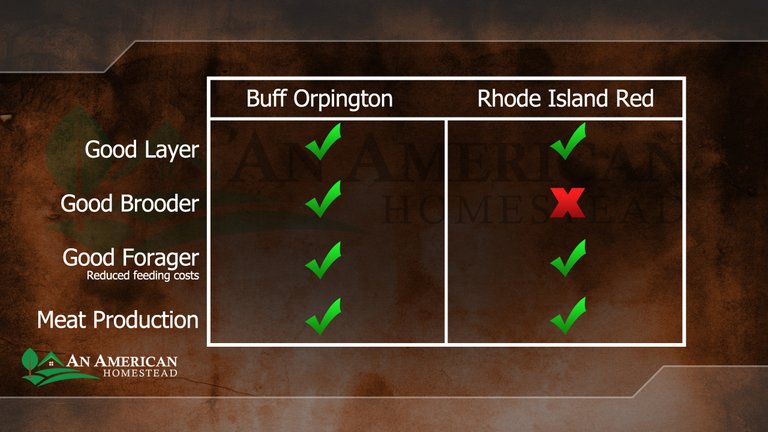
After over 4 years of experimentation and trial and error, we can tell you what we have found works best for raising chickens off grid. You of course want good egg productions, meat production, the ability to brood your own chicks and of course keep your cost down ALL AT THE SAME TIME! WOW! It may not sound like it, but that is a tall order that is not easy to fill.
- Some chicken breeds are great layers but not very good brooders. So you have to keep purchasing new chicks to renew your flock.
- Some chicken breeds are fantastic brooders, so much so that they usually all go broody at the same time...meaning you're not getting any eggs until their done.
- Some chicken breeds are great meat birds but they don't lay eggs very often and almost never brood.
- Some breeds have to be fed and never forage on their own and that means you have to keep either making food for them or buying feed. That gets expensive!
You need to find an explosive combination to meet all 4 of those qualifications in order to get a great well producing flock year round that sustains itself and reproduces itself. What do you think we've been doing for the past 4 years? :) We've cracked the code...er the egg.

The Buff Orpington meet all 4 of those qualifications. Sure they are not the best meat bird, but they are the best meat bird that will consistently and successfully brood chicks. They will also forage during the day and get most of the food they need on their own. And when they are not brooding, they are laying plenty of eggs for you to enjoy!
The Rhode Island Red shines the best when the Buff is brooding. The Red is also an average meat bird and will lay lots of eggs when the Buffs are brooding the next generation in your flock. And the Red will also forage and keep your feeding cost down.
So as the chart above suggest, a combination of the two breeds is the answer for having a great flock on the homestead that covers most of the bases in our opinion!
What chicken breeds are working for you? We want to hear what you have found! Be sure to comment below! THANKS!

ENJOY THE VIDEO!

Visit Us Online: http://AnAmericanHomestead.com


I like your blogs. I live in WIS, Zone 5a. Do you think 'icelandic chickens' would be a good choice here?
This video shows how you can raise chickens WITHOUT grain, just by providing enough compost for them to scratch around in and find their food. They get a diverse, natural diet and are significantly cheaper to raise when you don't need to expend extra money on food for them! Most animal feed is either expensive or of low quality for what you get and growing enough sunflowers or comfrey to provide additional feed to supplement free range scavenging is land that could be better used for other crops. Hope some find it interesting. great article @mericanhomestead !
I love this idea, but I'm not sure it's really feasible for most people. When you don't have a lot of land, having a giant mountain of compost is probably not the greatest idea. Not to mention the logistics of finding and retrieving good quality compost material seems like it might be a little difficult. But, I'm not someone who has the patience to maintain nice compost piles, either, so my opinion is probably skewed. I would love to see some examples of someone using this method on a much smaller scale.
Wow, compost instead of feed? That would reduce the cost of raising chickens. @ironshield
To practically zero! And they probably eat better than most other hens, plus they have to work a bit for it.... making you better compost!
I'd like to get my compost closer to the chickens... hmmmm now I must think. Haha
When we are ready to get our chickens, we will be getting Rhode Island Reds. I would like some Americana`s too, as they are not a broody chicken either. Both have a decent temperament.
Zac, Good stuff here... We are on the same page we have both of these breeds and along with a Wyandotte Rooster (a gift from a neighbor). We are not hatching eggs at this point but will be there in the next couple years. A couple items that we really like about both the breeds you have narrowed down your selection to is how hearty and tough the birds are, good in the cold and handle the heat well, this is important, hearty birds keep laying eggs all year long. They protect each other and have a wonderful sense when predators are around, it is amazing how fast they spot a chicken hawk in the sky and take cover under the coop.
In my opinion chicks are a must have if you are going to live the homestead lifestyle, they do so many things for you, there is just to many positive having them!
Keep up the good work Zac!
Thanks for posting and watching! Really appreciate it!
Weekly Homesteading Newsletter which is a series posted every Sunday that aims to help collect awesome articles and resources like this one! This article will be linked and your username featured if you accept - please let me know if it is alright to include your article as soon as possible! Thank you and have a great day!Great article @mericanhomestead! I would like to include this post in the next issue of the
Sure, go ahead and include and you don't need to ask in the future. Permission granted!
Thank you so much!
Hey there! I just wanted to inform you that your article has been included and linked in the most recent issue of the Weekly Homesteading Newsletter! Please check it out if you have the time! Thank you and have a great day!
Hello good video, but I am confused on the reds not being a good breeder. So, what do you do if you are not going to buy new red?
Good brooder, not breeder. They lay well, but they don't hatch and raise their babies well. You can take their eggs and put them under a broody buff orpington though, and they'll hatch and raise them.
You take the eggs from the red and stick them under a buff who is brooding. The buff will raise them as her own. Easy! :)
this comes at the perfect time, we were just talking about hatching some chicks for the first time and cycling through a few of our older birdies. We have 5 Barred Plymouth Rock hens (were gifted to us) and 4 Golden Comet hens (an RIR and white leghorn cross) right now. A couple of the Barred Rock hens seem to go broody but they don't seem to sit long. No luck hatching anything naturally yet.
Yeah, try the buffs, they will brood and be good mommas.
It is always a great source of useful information that is why I always like to watch your videos and I'm usually hoping for the next one to be published. Thanks for sharing.
you have said it all.....infact it was a successful experiment........thanks for sharing
Resteemit in hopes of seeing more answers!
This is a very informative video! We will be getting chickens soon and I have no experience with chicken breeds! Resteemed (:
Upvoted, followed, and resteemed! Thanks for sharing!
Thanks for another very informative video, Keep up the great work !!!
My husband has FINALLY agreed to allow me to get chickens 🐔I can't wait!!!
Hello dear friend, you are looking for
@haji
I am a new follower of yours and have been curious about this subject. Thanks for sharing your results after four years of dedication. I am placing this information in my toolbox for future use.
Zac, I would have thought that between you and Tim you would have already have enough stock brooding to keep your chicken system going without having to introduce new stock by now. is it really that difficult to get the hens brooding?
the exact two breeds we had....before now fortifying the coop and chicken run 2.0, 29ft long :) great vid!
Your Father in Law is amazing, thank you for posting!
@mericanhomestead Top notch as always! You should post the episode where Tim takes us through the meal worm process. That is where the magic happens!
The best chicken here in tropical northern Australia is a duck. Khaki Campbell's.
In summer chickens lay in the shade with their wings held out to the sides, panting in obvious distress. They don't lay because of the heat and high humidity. They don't lay in our extremely mild winters because they're moulting.
Ducks don't care about stinking hot, humid weather.
They keep on truckin' regardless.
I'm not sure how broody they are but at least there are no restrictions on owning drakes like there are with roosters in built up areas.
I will always own chickens as I need them to work over compost but the chicken flock are the "B" team here.
Where do you get your birds from? Any hatcheries you can recommend?
Great post full of excellent information! I say Tim needs some more camera time. I really like the way he explains things. We had Welsummers, Plymouth Rocks, and Easter Eggers. They are all well suited for U.S. zone 7. They are all very good foragers so feed costs go down during the summer for sure. I can't say if any of them are good brooders or not because we collected all of the eggs. Keep these great videos coming.
Tim
This is valuable information. Many channels only tell you what they like. You have given us experience with multiple chickens. This helps me a lot as I will be making my choice soon.
Nice
How do you know if your chickens are doing a good job foraging? Mine get fed five quarts of feed every other day, I have 21 chickens. They free range. But it has been real hot here, so I don't think they're foraging as much. Being a forager was a consideration when purchasing (not high up there, but there lol).